The International Grappling Tournament Where Russians Dominate
The International Grappling Tournament Where Russians Dominate
Did you know there is an international gi and no-gi grappling tournament that takes place every year where not a single champion hails from Brazil or the US
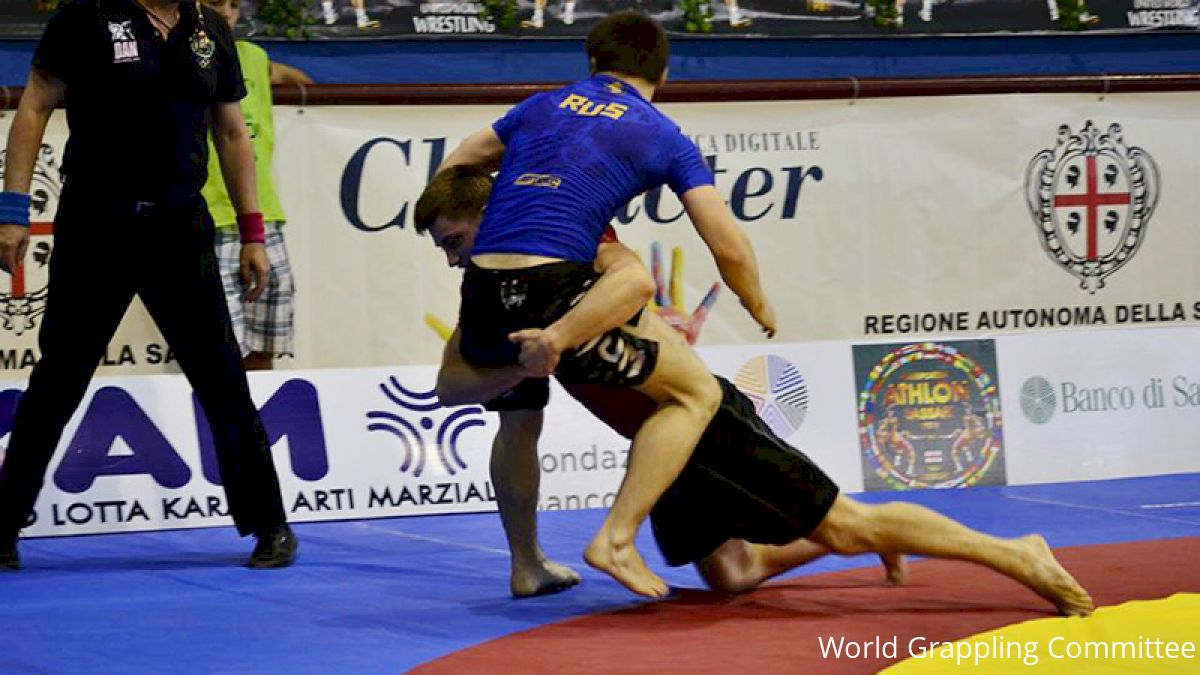
Did you know there is an international gi and no-gi grappling tournament that takes place every year where not a single champion hails from Brazil or the USA?
That’s right. Representatives from up to 20 countries come together to face off under rules that bear more than a passing resemblance to jiu-jitsu.
But most people have never heard of it, and it remains on the fringes of our sport.
This style of grappling is called – well, grappling, actually – and it’s organized and officiated by none other than United World Wrestling (UWW), the international governing body that oversees Olympic wrestling.
Armlocks, chokes, leglocks, takedowns; they’re all there. But the rules differ considerably from what we’re used to seeing in major federations like the IBJJF or the UAEJJF, or even the ADCC (considered the major no-gi grappling series in the world).
Restart positions that take inspiration from par terre in wrestling, reduced rounds of 5 minutes, and a circular mat – the rules are easy to learn and an experienced grappler would no doubt adapt to them easily enough.
So why don’t we see higher profile competitors in these tournaments?
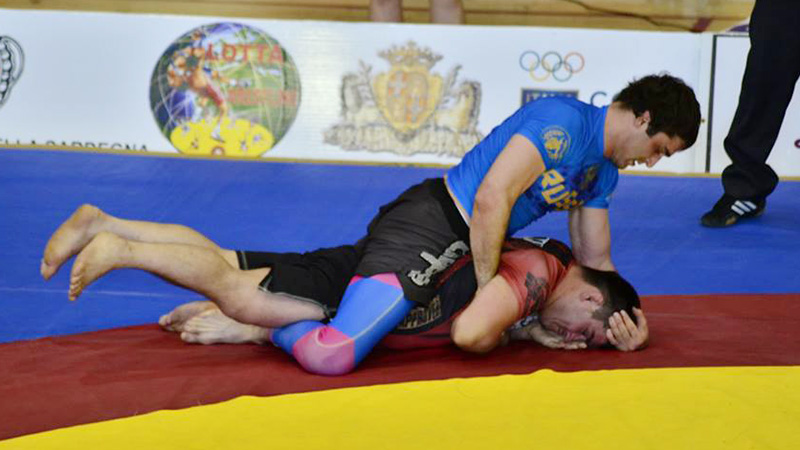
What’s surprising is the complete absence of certain countries that could no doubt field extremely strong teams.
Part of this is due to the fact that national federations must select and send teams. Entrants can’t just register. As countries can only send one rep per weight category, grapplers need to qualify for the chance to fight.
And the federations that send the teams to take part in continental and world championships must be recognised by the UWW. If it’s not the national wrestling federation that organises this, then another federation can become an associate member of UWW and take responsibility.
Pedro Gama Filho is the president of the Brazilian Wrestling Federation (BWF), and he’s also a black belt in jiu-jitsu: “Brazil did not send a team as our annual planning is done in the middle of the previous year - for instance, 2015 was done in the middle of 2014, when grappling was completely out of the UWW,” he says.
For Brazil, it was simply a case of bad timing.
“The re-inclusion of grappling came in January when we already had a huge schedule for the year, including organizing a world championship.”
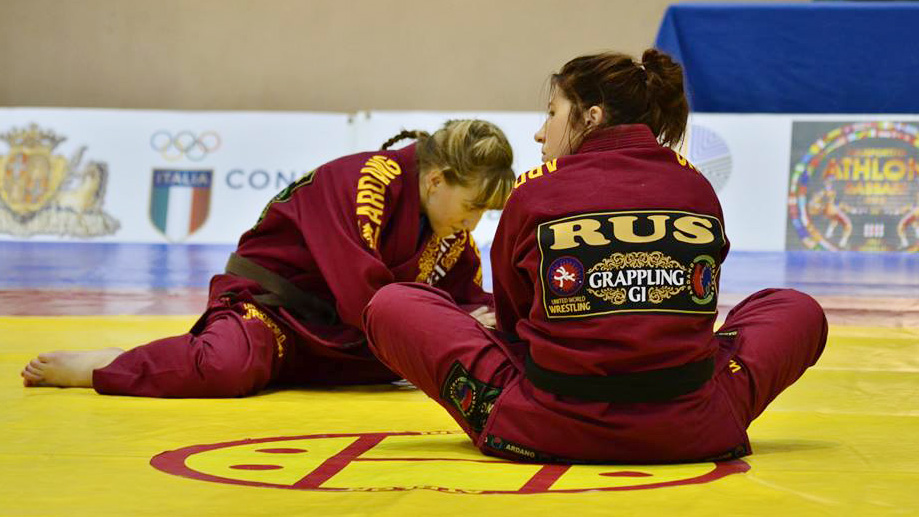
The dominant forces in UWW’s grappling are invariably Russian athletes, with former Soviet states and a few European countries trailing behind.
Russia walked away with 16 gold medals out of a possible 26 and medalled in every single category. In comparison, the USA only managed a silver and three bronze medals in no-gi at the most recent games in Antalya, Turkey, on Oct 11.
“Each year the level of competition in Russia grows, while in other countries the level remain usually the same,” says Rizvan Bochkaev, president of the UWW’s World Grappling Committee.
“The Russian team also had access to the Olympic training center in Novogorsk, where the Olympic freestyle and Greco-Roman wrestling teams train.”
“I should add also that Russia as a long tradition in wrestling and fighting sports,” he says.
With a long tradition in wrestling and judo, not to mention sambo, their own national submission-fighting style, Russia consistently produce strong grapplers who perform well under UWW rules.
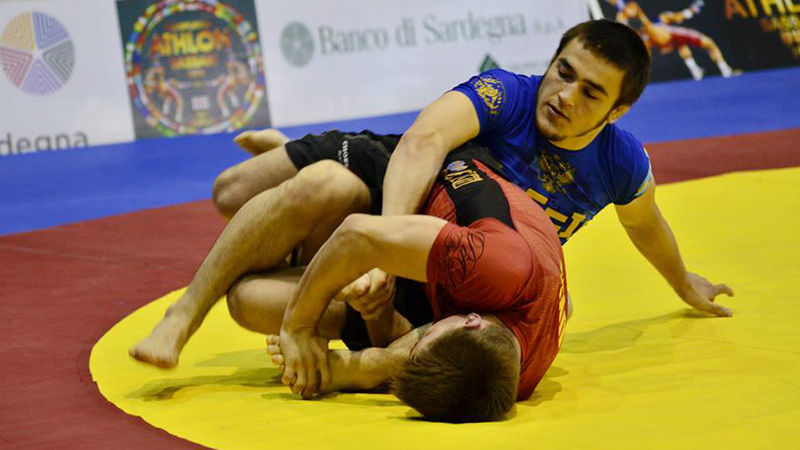
And by adding jiu-jitsu to their arsenal, their grappling prowess became even more fearsome. The efficiency of BJJ in submission grappling competitions is kown world-wide. Russian athletes are not well-known in Brazilian jiu-jitsu circles, but they can now claim homegrown black belts.
Maybe one of the biggest factors in Russia’s success is the support given to their team, and this cannot be underestimated.
The Russian team are given financial support to train and travel, whereas some other countries – including the U.S. – do not.
Russia’s support system for it’s athletes pays off. They took 5 out of 8 golds in the men’s gi grappling and enjoyed a clean sweep in the no-gi.
A quick scan of the UWW grappling results will result in little recognition. Even experienced analysts of the sport are left resorting to Google in an attempt to identify medallists.
The aforementioned Russian competitors aside, representatives from other countries appear to be a motley crew of former MMA fighters, freestyle wrestlers and low-level jiu-jitsu practitioners - few of them are even black belts in the art.
Japan and the USA occasionally send one or two accomplished grapplers, but the powerhouses are sending tough teams from top to bottom.
The most notable name among the list of champions is Magomed Abdukadirov, the Russian submission grappler who competed in ADCC in Sao Paulo last August and manhandled former UFC lightweight champion Benson Henderson before submitting him by rear naked choke.
Beyond Abdukadirov and his Russian teammates, the level of talent is not even close to other competitions on the international grappling circuit.
Countries that could potentially field strong teams include Poland and the UK, two European nations with strong grappling communities and many talented homegrown BJJ black belts. But fielding a team is costly and complicated, and countries with less-resourceful national wrestling federations are usually left out of proceedings.
At present, and with the UWW’s brand of grappling flying under the radar of most grappling competitors, countries with deep talent pools such as the USA and Japan continue to send weak teams.
American Matt Holt is an All-American Greco-Roman wrestler and a brown belt in jiu-jitsu as part of the Checkmat team. He took bronze in the 66kg no-gi division at the most recent Grappling Games in Turkey and believes that the location of the trials is off-putting for many potential competitors.
“Hold [the trials] in California or Las Vegas where the access is easy and you are near the countries best grapplers,” he suggests.
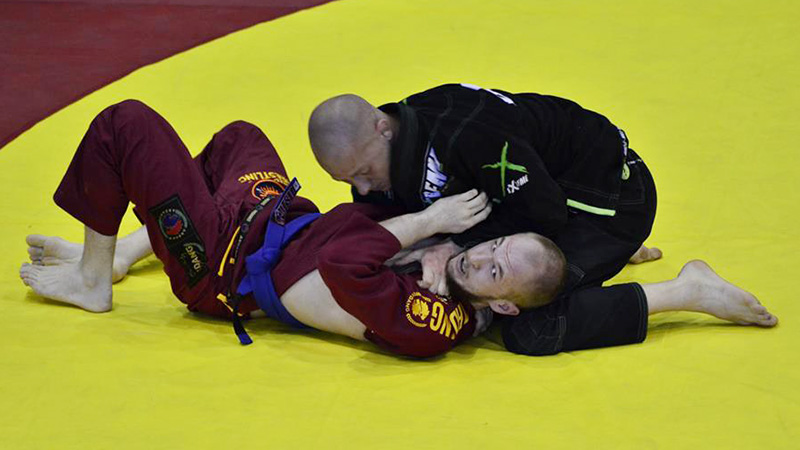
The Russians may rule the roost for now, but an influx of new talent is on the horizon as Brazil has decided that they will participate in 2016 - and predictably, they fancy their chances.
“We will be there to win tournaments in the years to come,” says Gama Filho. “We are confident we will dominate.”
Like no-gi action? Sign up to watch the 2015 World Jiu-Jitsu No-Gi IBJJF Championship on Nov 7-8, exclusive to FloGrappling.
That’s right. Representatives from up to 20 countries come together to face off under rules that bear more than a passing resemblance to jiu-jitsu.
But most people have never heard of it, and it remains on the fringes of our sport.
Grappling, But Not As You Know It
This style of grappling is called – well, grappling, actually – and it’s organized and officiated by none other than United World Wrestling (UWW), the international governing body that oversees Olympic wrestling.
Armlocks, chokes, leglocks, takedowns; they’re all there. But the rules differ considerably from what we’re used to seeing in major federations like the IBJJF or the UAEJJF, or even the ADCC (considered the major no-gi grappling series in the world).
Restart positions that take inspiration from par terre in wrestling, reduced rounds of 5 minutes, and a circular mat – the rules are easy to learn and an experienced grappler would no doubt adapt to them easily enough.
So why don’t we see higher profile competitors in these tournaments?

The Absence of Grappling Superpowers
What’s surprising is the complete absence of certain countries that could no doubt field extremely strong teams.
Part of this is due to the fact that national federations must select and send teams. Entrants can’t just register. As countries can only send one rep per weight category, grapplers need to qualify for the chance to fight.
And the federations that send the teams to take part in continental and world championships must be recognised by the UWW. If it’s not the national wrestling federation that organises this, then another federation can become an associate member of UWW and take responsibility.
Pedro Gama Filho is the president of the Brazilian Wrestling Federation (BWF), and he’s also a black belt in jiu-jitsu: “Brazil did not send a team as our annual planning is done in the middle of the previous year - for instance, 2015 was done in the middle of 2014, when grappling was completely out of the UWW,” he says.
For Brazil, it was simply a case of bad timing.
“The re-inclusion of grappling came in January when we already had a huge schedule for the year, including organizing a world championship.”

Why Russia Are #1
The dominant forces in UWW’s grappling are invariably Russian athletes, with former Soviet states and a few European countries trailing behind.
Russia walked away with 16 gold medals out of a possible 26 and medalled in every single category. In comparison, the USA only managed a silver and three bronze medals in no-gi at the most recent games in Antalya, Turkey, on Oct 11.
“Each year the level of competition in Russia grows, while in other countries the level remain usually the same,” says Rizvan Bochkaev, president of the UWW’s World Grappling Committee.
“The Russian team also had access to the Olympic training center in Novogorsk, where the Olympic freestyle and Greco-Roman wrestling teams train.”
“I should add also that Russia as a long tradition in wrestling and fighting sports,” he says.
With a long tradition in wrestling and judo, not to mention sambo, their own national submission-fighting style, Russia consistently produce strong grapplers who perform well under UWW rules.

And by adding jiu-jitsu to their arsenal, their grappling prowess became even more fearsome. The efficiency of BJJ in submission grappling competitions is kown world-wide. Russian athletes are not well-known in Brazilian jiu-jitsu circles, but they can now claim homegrown black belts.
Maybe one of the biggest factors in Russia’s success is the support given to their team, and this cannot be underestimated.
The Russian team are given financial support to train and travel, whereas some other countries – including the U.S. – do not.
Russia’s support system for it’s athletes pays off. They took 5 out of 8 golds in the men’s gi grappling and enjoyed a clean sweep in the no-gi.
Who Are The Champions?
A quick scan of the UWW grappling results will result in little recognition. Even experienced analysts of the sport are left resorting to Google in an attempt to identify medallists.
The aforementioned Russian competitors aside, representatives from other countries appear to be a motley crew of former MMA fighters, freestyle wrestlers and low-level jiu-jitsu practitioners - few of them are even black belts in the art.
Japan and the USA occasionally send one or two accomplished grapplers, but the powerhouses are sending tough teams from top to bottom.
The most notable name among the list of champions is Magomed Abdukadirov, the Russian submission grappler who competed in ADCC in Sao Paulo last August and manhandled former UFC lightweight champion Benson Henderson before submitting him by rear naked choke.
Beyond Abdukadirov and his Russian teammates, the level of talent is not even close to other competitions on the international grappling circuit.
How To Include Bigger Names?
Countries that could potentially field strong teams include Poland and the UK, two European nations with strong grappling communities and many talented homegrown BJJ black belts. But fielding a team is costly and complicated, and countries with less-resourceful national wrestling federations are usually left out of proceedings.
At present, and with the UWW’s brand of grappling flying under the radar of most grappling competitors, countries with deep talent pools such as the USA and Japan continue to send weak teams.
American Matt Holt is an All-American Greco-Roman wrestler and a brown belt in jiu-jitsu as part of the Checkmat team. He took bronze in the 66kg no-gi division at the most recent Grappling Games in Turkey and believes that the location of the trials is off-putting for many potential competitors.
“Hold [the trials] in California or Las Vegas where the access is easy and you are near the countries best grapplers,” he suggests.

Coming Soon, Brazil vs Russia
The Russians may rule the roost for now, but an influx of new talent is on the horizon as Brazil has decided that they will participate in 2016 - and predictably, they fancy their chances.
“We will be there to win tournaments in the years to come,” says Gama Filho. “We are confident we will dominate.”
Like no-gi action? Sign up to watch the 2015 World Jiu-Jitsu No-Gi IBJJF Championship on Nov 7-8, exclusive to FloGrappling.